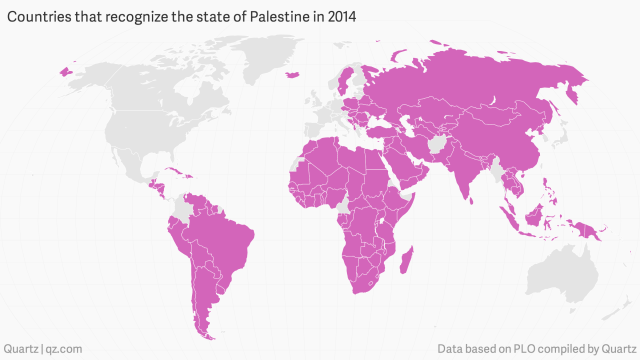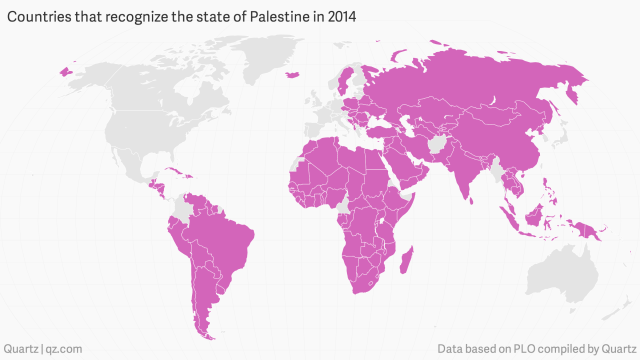Britain's Parliament votes to recognize state of Palestine


A free daily email with the biggest news stories of the day – and the best features from TheWeek.com
You are now subscribed
Your newsletter sign-up was successful
On Monday night, Britain's lower house of Parliament voted, 274 to 12, to pass a nonbinding resolution granting diplomatic recognition to a Palestinian state. Prime Minister David Cameron's government doesn't have to act on the resolution, but the lopsided support from all parties demonstrates the widespread frustration, especially in Europe, at the breakdown in Israel-Palestinian talks and simmering anger over Israel's bombing of Gaza over the summer. About half of the 650-seat House of Commons abstained from the vote.
Iframe Code
The resolution was put forward by Grahame Morris, a Labour lawmaker who leads a group called Labour Friends of Palestine. But there was plenty of Conservative support. Nicholas Soames, a Conservative lawmaker and grandson of Winston Churchill, argued that "to recognize Palestine is both morally right and is in our national interest." And Richard Ottoway, the Tory chairman of the House of Commons foreign affairs committee, said that while he has "stood by Israel through thick and thin, through the good years and the bad," things have to change:
The Week
Escape your echo chamber. Get the facts behind the news, plus analysis from multiple perspectives.

Sign up for The Week's Free Newsletters
From our morning news briefing to a weekly Good News Newsletter, get the best of The Week delivered directly to your inbox.
From our morning news briefing to a weekly Good News Newsletter, get the best of The Week delivered directly to your inbox.
Under normal circumstances, I would oppose the motion tonight; but such is my anger over Israel's behavior in recent months that I will not oppose the motion. I have to say to the government of Israel that if they are losing people like me, they will be losing a lot of people. [Ottoway, via The New York Times]
A spokesman for Israel's foreign ministry, Paul Hirschson, criticized Britain's vote, noting that "there's no legal weight behind" the resolution, saying it still "sours" relations between Israel and longtime ally Britain, and accusing Europe of "playing to the Arab world" for financial gain. "Europe is in terrible economic condition, and they have to trade with the Arab world," he told The New York Times.
Several European Union nations are considering formally recognizing a State of Palestine, as a way to further negotiations toward a two-state solution, and two weeks ago Sweden pledged to jump in first. If that seems like a radical step, Europe and the U.S. are in the clear minority. Of 193 U.N. member states, 134 recognize a State of Palestine. This map, from Quartz, shows who (and where) they are. --Peter Weber

A free daily email with the biggest news stories of the day – and the best features from TheWeek.com
Peter has worked as a news and culture writer and editor at The Week since the site's launch in 2008. He covers politics, world affairs, religion and cultural currents. His journalism career began as a copy editor at a financial newswire and has included editorial positions at The New York Times Magazine, Facts on File, and Oregon State University.
-
 The Week Unwrapped: Have televised confessions quelled protests in Iran?
The Week Unwrapped: Have televised confessions quelled protests in Iran?Podcast Plus, why has Elon Musk turned from Mars to the Moon? And will the BBC prove to be a puzzles champ?
-
 The week’s best photos
The week’s best photosIn Pictures An Andean god, a rogue squirrel, and more
-
 AI surgical tools might be injuring patients
AI surgical tools might be injuring patientsUnder the Radar More than 1,300 AI-assisted medical devices have FDA approval
-
 Is Gaza ceasefire deal about to fizzle out?
Is Gaza ceasefire deal about to fizzle out?Today's Big Question Israel and Hamas accuse each other of deliberately breaking first phase of the fragile truce, which is set to expire on Saturday
-
 Is Donald Trump behind potential Gaza ceasefire and will it work?
Is Donald Trump behind potential Gaza ceasefire and will it work?Today's Big Question Israel and Hamas are 'on the brink' of a peace deal and a hostage exchange, for which the incoming president may take credit
-
 Mossad's history with explosive technology
Mossad's history with explosive technologyThe Explainer Infamous Israeli spy agency has not claimed responsibility for Hezbollah's exploding pagers but has 'decades-long' list of remote assassinations
-
 Hamas and Hezbollah strikes: what does it mean for Israel?
Hamas and Hezbollah strikes: what does it mean for Israel?Today's Big Question Iran vows revenge for death of Hamas political leader in Tehran, hours after Israeli strike kills top Hezbollah member in Beirut
-
 British warship repels 'largest Houthi attack to date' in the Red Sea
British warship repels 'largest Houthi attack to date' in the Red SeaSpeed read Western allies warn of military response to Iranian-backed Yemeni rebels if attacks on ships continue
-
 Houthi rebels claim Red Sea ship attacks
Houthi rebels claim Red Sea ship attacksspeed read Iran-backed Yemeni group vows to escalate aggression towards Israel-linked vessels in revenge for Gaza war
-
 Israel plans next phase of Gaza war as first hostages released
Israel plans next phase of Gaza war as first hostages releasedSpeed read After four-day ceasefire 'we will not stop' until destruction of Hamas, says Israel
-
 Israel says Gaza split in two in 'significant stage' of war against Hamas
Israel says Gaza split in two in 'significant stage' of war against HamasSpeed Read Troops expected to enter Gaza City within 48 hours as US secretary of state continues 'diplomatic shuttle'
